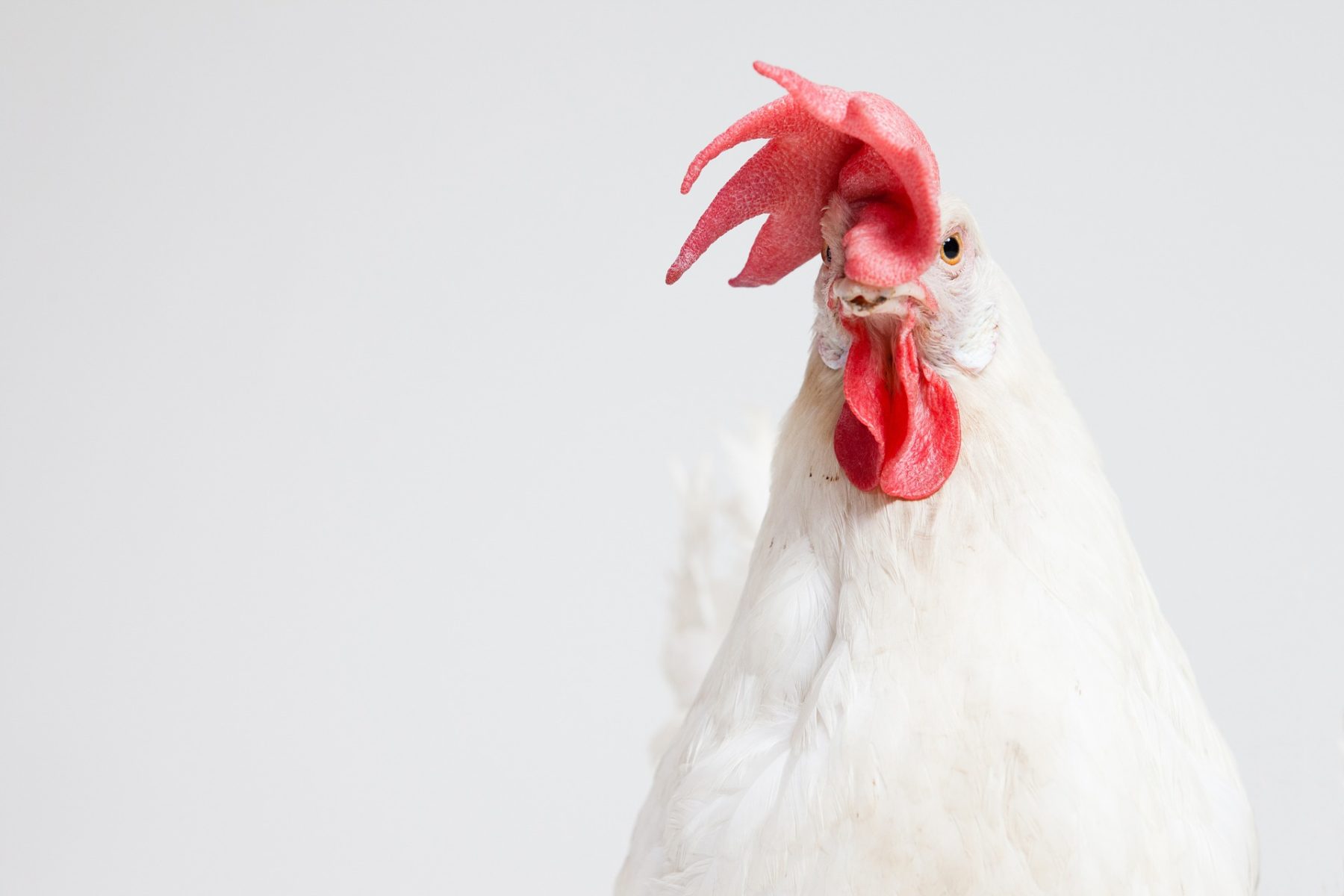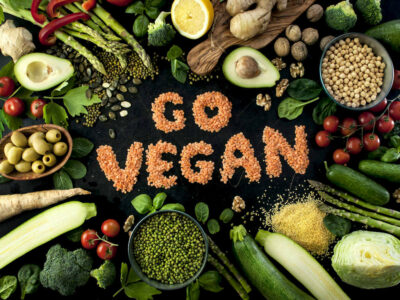Whether you care about your health, the environment, other animals, other people, or the future of our Earth, eating a plant-based diet can have a profoundly positive impact.
Reasons To Be Vegan
While every person who becomes vegan has their own reasons, there are four motivations that crop up over and over again: animals, health, environment, and people.
For Animals
It is obvious, if we think about it for even a moment, that animals’ lives are taken from them for the meat that is consumed. But many people don’t realise that egg-laying hens, male chicks hatched into the egg industry, cows farmed for dairy, and their calves are all slaughtered too. And it’s not just the denial of their right to life that motivates people; it’s the way they are forced to live. The vast majority of animals are factory farmed, which means even their most basic needs and desires are denied them. They don’t get to roam, roost, feel the earth beneath their feet or the sun on their backs; they never get to choose a mate, build a nest, spread their wings, or fly. We feel sure that one day we’ll look back on animal agriculture with profound shock at the cruelty humans were capable of.

For Your Health
A balanced vegan plant-based diet is associated with lower risks of many chronic diseases, including heart disease, type 2 diabetes, and some cancers. As all processed meat is carcinogenic, at the very least those who are motivated to improve their long-term health would do well to avoid products like bacon, sausages, jerky, and chicken nuggets. The same is not true of processed plant-based foods, however, which means tasty foods like VFC’s vegan fried chick*n – as well as vegan bacon, sausages and jerky – is a great way to get the flavours we love without the risks.
New vegans have reported many other benefits, too, including reduced inflammation, improvement in arthritis symptoms, better sleep, better digestion, more energy, clearer skin, healthier hair, reduced depression symptoms, and so much more.
For the Environment
It should come as no surprise that when we grow foods, we impact the natural environment, but different foods have very different eco footprints. In every category – from climate impact, to biodiversity impact, to water and land use, to deforestation – plant-based foods do better than animal-based foods. If we want to reduce our own impact, and help the Earth and all her inhabitants to thrive, then we would do well to choose plant-based foods over animal-based ones at every opportunity.
For People
Increasingly, people are coming to recognise the negative impact that farming animals has on people. There are global impacts, including animal agriculture being a leading driver of climate breakdown as well as antibiotic resistance and the emergence of dangerous pathogens that have pandemic potential.
But there are local impacts, too, including the increase in community violence when a slaughterhouse is opened in an area, and the dangers to local residents of breathing in the polluted air emitted by factory farms.
What Are the Benefits of Being Vegan?
There are so many benefits of being vegan! Here are just a few.
A Vegan Diet Is Rich in Nutrients
When we adopt a whole food plant-based diet, we prioritise vegetables, salads, beans and legumes, grains, nuts, fruits, seeds, and all the products made from them. And in this way, we take in a huge amount of vitamins, minerals, antioxidants, fibre, and other health-boosting nutrients. This allows us some leeway to eat some convenient vegan foods, too, so we don’t need to miss out on any of the meals or snacks we love. That’s a win-win.
Our Choices Reflect Our Love of Animals
Most people say they love animals but still pay for them to be factory farmed and slaughtered. It’s just too easy to look the other way and not to think about how our choices affect others. But when we are brave enough to educate ourselves, to really understand and face up to how our foods cause harm and suffering to others, we can make simple swaps to our diet which have a hugely positive impact. Then, we can truly be animal lovers, and can demonstrate our love and our compassion at every meal.
Vegan Food Can Boost Your Mood
It’s true! Lots of new vegans have reported a shift in their mood when they stopped eating animal products. We don’t know why this should be but perhaps it is associated with knowing that our food choices remain satisfying to us, but they are so much kinder to the Earth, to animals, and to other people. It is also possible that in opening our eyes to the impacts of our dietary choices we discover a deep appreciation and connection with the natural world. Many new vegans say they spend more time in nature, and this is a powerful mood booster, too.
Reduce Your Risk Of Heart Disease
Heart disease is the number one killer in many countries of the global north. In most cases, it is avoidable with lifestyle changes. Smoking is a risk, and so is not exercising. But our diets are also important for heart health. When we base our meals around whole plant foods we are doing something wonderful for ourselves: giving us the best shot at a healthy future and a long life.
Lower Your Chances of Getting Certain Types of Cancer
All processed meats cause cancer, and all red meat is “probably carcinogenic”, too. This is not an opinion dreamed up by the vegan community, it is a fact stated by the World Health Organization. If you don’t smoke because of its links to cancer, then ending the consumption of meat is a no-brainer. But it’s not just meat; milk from animals comes with risks, too. Research shows that those who eat a healthy plant-based diet have “a marked reduction in mortality and age-adjusted incidence of many cancers common in Western society. These cancers include breast, prostate, colon, pancreas, ovary, and uterine endometrium cancers.”
Join a Social Justice Movement
Veganism sits at the intersection of many social justice movements because it is about helping other people, our planet, and all the other species who live on it. It is about ensuring food justice and food equity, where wealthier nations are not taking more than their fair share while creating a huge amount of pollution and climate change that disproportionately affects less wealthy peoples. It is about not asking other people to do the job of slaughtering that we would not do ourselves, knowing it increases the risk of mental health problems in those people. It is about compassion and integrity, justice, and fairness. No wonder people all over the world are adopting a vegan diet.
What Are the Negatives of Being Vegan?
There are very few. In some parts of the world, there may not be many – or any – options available in restaurants, and it can certainly take a little time to adjust to shopping for and cooking different foods. But if we go into it with curiosity and a positive intention of learning, exploring, and embracing something new, then it can be a wonderful journey of discovery and the best decision we will ever make.
Is Being Vegan the Healthiest?
It can be, but it depends what we eat. There are plenty of unhealthy foods that are vegan – like chips, fizzy drinks, biscuits, and chocolate. We wouldn’t expect to be healthy if we based our meals around those. But when we prioritise foods from the abundant range of vegetables, grains, nuts, beans and legumes, fruits, herbs, salads, and seeds, we can get the health-boosting nutrients we need without the detrimental impacts. So, yes, when we choose wisely, veganism is incredibly healthy for us, but all plant-based foods are better than animal-based foods when it comes to antibiotic-resistant pathogens, zoonotic diseases, and ill-health and suffering caused by climate breakdown.
What Are the Environmental Benefits of Being Vegan?
There are so many good reasons to be vegan in order to protect the planet. Eating a plant-based diet:
- Reduces the amount of land needed to grow food, which means we could end deforestation, and return vast swathes of agricultural land to nature, which would reverse the devastating decline in wild populations
- Reduces the amount of methane produced. Methane is a dangerous climate-altering gas and the biggest human-generated source of it is farming animals
- Reduces the amount of water needed to produce food. With the exception of nuts (as those trees require a lot of water) plant-based foods use a lot less water than animal-based foods. Cheese wastes the most water, then prawns, milk, farmed fish, beef, then meat from pigs and sheep. Meat from chickens uses four times as much freshwater per 100g of protein as tofu
- Pollutes less. The billions of farmed animals on the planet create a lot of waste, and that creates both air and water pollution. Meat production leads to thousands of air-quality related deaths every year, and the animals’ slurry gets into rivers and oceans where it creates toxic algal blooms which decimate wildlife and can kill people
So, to recap, a plant-based diet is better for our climate, oceans, rivers, forests, wild spaces, wildlife, and us. Good to know, hey?
What To Know About Vegan Diets?
Once we know about the amazing reasons to eat a vegan diet, we need to know how to go about adopting it. Here are a few tips to get you started.
Meal Planning
To avoid the ‘what do I eat?’ panic at mealtimes, it’s best to plan ahead, at least for the first few weeks of being vegan. Search online for amazing recipes, and follow some vegan food accounts to find out which products you should be looking out for. Make a shopping list, and be sure to allow a little extra time for the first few shops. Although reading labels and checking out new parts of the supermarket can take a little longer than usual, you will be rewarded with a bounty of delicious plant-based goodies.
Know Your Motivation
It really helps to keep learning about veganism as the more we know of the impacts of our food choices, the more motivated we remain to do the right thing – even when we are surrounded by non-vegan foods, and marketing designed to tempt us. There are many excellent films to watch, including Cowspiracy, The Game Changers, Seaspiracy, and What the Health. And there are plenty of books, articles, and blogs on nutrition and health, animal rights, and environmental impacts.
Don’t Set Yourself Up To Fail
If you have a secret addiction to cheese or chocolate, it’s OK to start out being vegan apart from that one item. Make all the other changes, discover just how much tasty vegan food is out there, try some new recipes, and expand your culinary horizons. Then, when you have settled into this new way of eating, think again about that one item. Can you find a vegan cheese or chocolate that scratches that itch? If you can, that’s wonderful, but if not, remember that it is better to be 99% vegan than not to be vegan at all.
Join a Vegan Challenge
There are many excellent guided vegan challenges that are free to join and help make the transition super simple. Try Veganuary’s 31-day challenge, which is most popular for the month of January. Or check out Generation Vegan’s 7-day vegan challenges – for health, for the planet, for humanity, or for animals – or take their 30-day challenge.
Be Kind to Yourself
It can take some time to undo many years of habits and social conditioning. If you slip up or give in to temptation that’s OK. It doesn’t mean you’re not vegan; it just means you’re human. After all, we are bombarded by pro-meat and dairy messaging every day and old habits can be hard to break. If you slip up, don’t give up. Chalk it up to experience, go and treat yourself to a tasty vegan treat, and get on with being the kind-hearted, environmentally responsible, wonderful human being you are.
Conclusion
Choosing to eat a vegan diet is great news for ourselves, our mental and physical health, our families and communities, and the global human population. It is also a great way to protect the natural world, end the suffering of farmed animals, and reverse the decline in wild species. It is the one action we can take every day that has such an incredibly positive impact on the world around us. We love being vegan, and we think you will, too.



